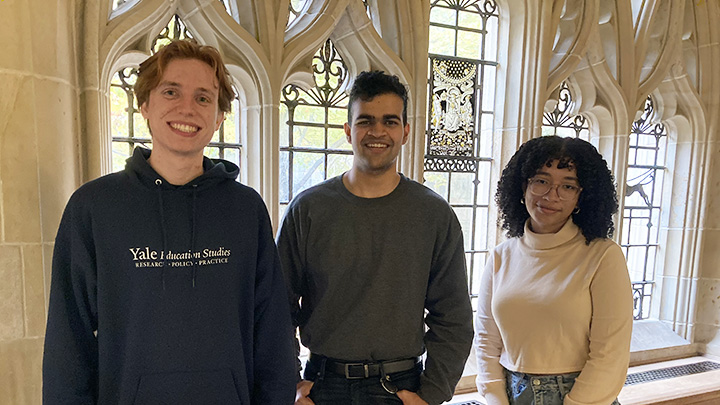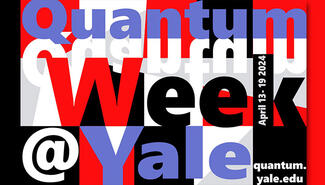Quicksearch and beyond: Students teach students how to navigate library resources
“In my first year, my process for doing research was not the best,” says Vinny Sriram ’25, an Ethics, Politics, and Economics major. “When I saw the opportunity to become a library peer mentor, I thought a workshop in research skills was something I would have made great use of myself. I wanted to increase my library skills and become an expert—and, personally, I find the best way to learn something is to teach it—so I applied to become a peer mentor.”
In the library’s new peer mentoring program, students help fellow students hone their research skills. The weekly series of mini sessions cover the basics and more. The topics offered in the 30-minute online workshops include “Let’s Find Books,” “Essential Library Research Skills,” and “How to Find Scholarly Articles.” Workshops are offered in several evening and weekend time slots to accommodate students’ busy schedules. Undergraduate and graduate students are welcome.
“Through this training, I learned a lot, and I’m excited to share that to help my peers,” Sriram says. “Most students procrastinate and then rush at the last minute. They think about writing their papers when they are due. Ideally, they would attend these workshops beforehand. Now that the first wave of midterms is over, I will definitely suggest to my friends that they sign up. Going to a workshop takes commitment but not much time.”
Kelly Blanchat, undergraduate teaching and outreach librarian, trains these student employees, providing a solid framework for their own mentoring sessions. Mentors learn the fundamental research skills needed to navigate the library’s extensive resources, such as Quicksearch, Articles+, and Databases. Building on the skills acquired in the training, library peer mentors then host their own workshops.
Blanchat encourages mentors to incorporate examples from their own research experiences into their individual sessions. Through their examples, the students show others how they went beyond the basics to solve unique and challenging research problems, accessing the library’s full range of research tools.
David Donnan ’24 is a Theater major in the Education Studies Program. “I organized my session around books for my English and Theater classes that were hard to find,” he says. “The Glass Menagerie, for example. The first search result was Beinecke’s library shelving facility, but I needed the book that afternoon for a monologue class. So I used the “search by location feature” and found a copy in Bass Library.
“I was also looking for A Third University is Possible. Yale does not own that book, so I was able to use that example to introduce the Interlibrary Loan and BorrowDirect features of the library site.”
Before leading their first workshops, mentors present their sessions to a stand-in audience—Blanchat and fellow mentors—both to practice teaching and to get helpful feedback. “One of the biggest surprises is that Kelly makes these workshops look so easy. They’re tough sometimes,” says Donnan. “I feel I have gained a lot of presentation skills and the ability to keep track, think on the spot, articulate process in a way that people can follow. It was also great to get positive feedback, which helped with nerves, and it was helpful to see how other mentors did their presentations, too.”
When presenting the run-through of her workshop for the group, Isabelle Staco ’25 found what she describes as a “cool way to compare and contrast research” using advanced search. “It gave me an interesting perspective for looking at historical research,” says Staco, who is double-majoring in Molecular Cellular and Development Biology and History of Science Medicine and Public Health. “I found a new research skill that I will definitely use in the future. I could never have found it if not for the library mentor program.”
Blanchat developed the Library Peer Mentors program in the summer of 2022 and hired these three students in the fall. “There is a strong foundation of peer-to-peer support within Yale College,” says Blanchat, “from peer liaisons to the Academic Strategy Mentors, writing partners, and Student Athlete Mentors. With Yale Library—especially Bass Library—central to academic work, it seemed only natural to expand peer support into research skills. There’s an important perspective that students can provide to each other. I am excited to see how these library peer mentors grow into this program throughout this inaugural year.”
Blanchat encourages the library peer mentors to suggest additional workshop topics that will support the academic work of their peers. New workshops and events will be announced on the library website as they open for registration.
Learn more and register for one or more Library Peer Mentors workshops. Email Kelly Blanchat with questions, suggestions, and comments about the program.
—Deborah Cannarella
Image (left to right): David Donnan ‘24 (Branford College), Vinny Sriram ‘25 (Jonathan Edwards College), Isabelle Staco ‘25 (Benjamin Franklin College). Photo by Deborah Cannarella



